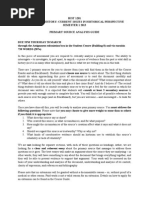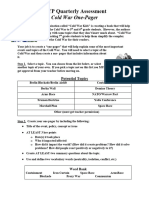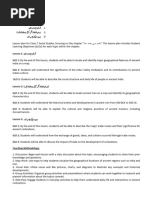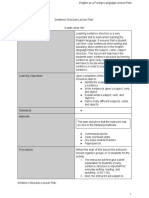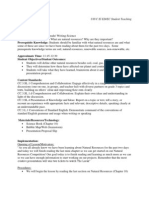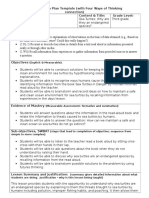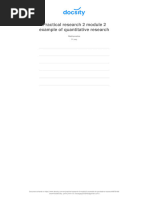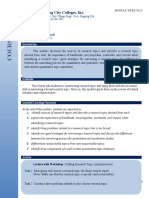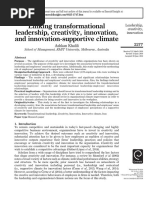Age of Revolutions Unit Plan
Age of Revolutions Unit Plan
Uploaded by
ArpanCopyright:
Available Formats
Age of Revolutions Unit Plan
Age of Revolutions Unit Plan
Uploaded by
ArpanOriginal Description:
Copyright
Available Formats
Share this document
Did you find this document useful?
Is this content inappropriate?
Copyright:
Available Formats
Age of Revolutions Unit Plan
Age of Revolutions Unit Plan
Uploaded by
ArpanCopyright:
Available Formats
Age of Revolutions Unit-by-Design Outline Arpan Patel
STAGE 1 DESIRED RESULTS
Established Goals
Survey the major revolutionary developments that occurred over the course of the 18th and 19th centuries.
Explore some of the factors that helped shape, drive, and facilitate these particular developments.
Examine how these events changed the world.
Use these historical events to serve as models to understand contemporary developments today.
Determine the extent to which these revolutions were successful through the process of historical inquiry.
Understandings Essential Questions
Students will understand that revolutions are not all How do different revolutions arise?
the same but result from a specific set of
circumstances. How do revolutions change the world?
Students will understand that revolutionary What lessons do past revolutions have to teach us
developments can have broad-reaching effects on about our world today?
various levels and aspects of society and the world-at-
large. To what extent were the revolutions of the 18th and
19th century successful?
Students will understand that past revolutions can
provide a framework of understanding for
contemporary developments in our world today.
Students will understand that revolutions do not always
achieve and meet their objectives and goals.
Students will know Students will be able to
Key facts related to the developments of the American Closely read, evaluate, contextualize, and corroborate a
Revolution, French Revolution, Industrial Revolution, broad range of primary and secondary sources to build
and Latin American Independence Movements. a comprehensive understanding of this time period
Traits/examples specific to new ideologies, processes, Establish probable trends, patterns, and cause/effect
and systems of organization developing during this relationships pertaining to these revolutionary
period of time developments.
Historical and contemporary examples of the impact of Analyze the lasting impact of past historical processes
revolutionary developments on various aspects and on our contemporary society through multiple, clear
areas of society. examples.
Construct evidence-based arguments through multiple
perspectives on the extent to which these revolutionary
developments were successful.
Source: Understanding by Design, Unit Design Planning Template (Wiggins/McTighe 2005) 1
Age of Revolutions Unit-by-Design Outline Arpan Patel
STAGE 2 ASSESSMENT EVIDENCE
Performance Tasks Other Evidence
Age of Revolutions Summative Unit Project Homework Presentations
Students will select an assessment modality from a provided Each day one individual student will be randomly selected to
project-grid, or create their own with teacher approval, to give a one to two-minute presentation based on what they read
demonstrate their summative answering of the Essential for homework the previous night. Afterwards, students will be
Questions from Unit 4 through the inquiry process. given the opportunity to ask clarifying questions based on the
assigned material. This assessment will serve as a diagnostic to
Key Criteria: give the teacher a representative sample of student
understanding of the pre-instructional experience.
Students will be arranged into a set of content groups based on
one of the major revolutionary developments that occurred Formative Discussion
over the course of the 18th and 19th centuries. In these assigned
expert groups, students will gather reliable and logical primary Students will be given opportunities to demonstrate their
and secondary sources to effectively support their conclusions formative understanding of learning objectives through
in their total summative answering of the Essential Questions facilitated student-driven discussions. By wondering, by asking,
from Unit 4. by sharing, and by thinking out loud, students will have the
opportunity to openly demonstrate their level of understanding
Each project will be graded based on the Thinking Skills rubric of the content and further extend learning through sufficient
which will assess students on the ability to utilize reading, application and exploration of the posed questions.
writing, and thinking strategies to investigate important
historical questions. Essays
Regardless of which medium students choose, they must At select points in this unit, students will write essays based on
include all information as listed on the summative project prompts related to the historical content they will have
checklist. surveyed. These essays will serve as opportunities for students
to show their ability to create evidence-based arguments
through historical thinking. Essays may be predicated on
practice of one or more of the following skills:
Contextualization, Sourcing, Corroboration, and Argumentation.
Content Quizzes
Throughout the unit, students will take a series of content
quizzes related to each movement surveyed in the Age of
Revolutions. These quizzes will provide the instructor a
summative understanding of the ability of students to meet
particular learning objectives as related to the historical
developments of this time-period.
Source: Understanding by Design, Unit Design Planning Template (Wiggins/McTighe 2005) 2
You might also like
- HSY2601 Study GuideDocument154 pagesHSY2601 Study GuideDeutro HeavysideNo ratings yet
- Assessment and RubricDocument3 pagesAssessment and Rubricapi-365740357100% (2)
- French Revolution UnitDocument4 pagesFrench Revolution Unitapi-270003746No ratings yet
- Myp Unit Planner (Health)Document5 pagesMyp Unit Planner (Health)Wan Ruziana SulaimanNo ratings yet
- Primary Source Analysis HandoutDocument4 pagesPrimary Source Analysis HandoutJessica Emma HeidrichNo ratings yet
- Reconstruction Timeline RubricDocument1 pageReconstruction Timeline Rubricapi-526098972No ratings yet
- Geotechnical Investigation Report of Burj KhalifaDocument13 pagesGeotechnical Investigation Report of Burj Khalifasumitchoudharymbm9171% (7)
- Year 9 WwiDocument28 pagesYear 9 Wwiapi-318829239No ratings yet
- Geography Ubd Development UnitDocument4 pagesGeography Ubd Development Unitapi-272248497100% (2)
- Hass Year 7 Unit Plan and Lesson SequenceDocument11 pagesHass Year 7 Unit Plan and Lesson Sequenceapi-474955325No ratings yet
- Lesson Plan - Final PDFDocument10 pagesLesson Plan - Final PDFapi-226324847No ratings yet
- The 3 Branches of State GovernmentDocument5 pagesThe 3 Branches of State Governmentapi-352139149No ratings yet
- Example of History Unit Plan Using Planner 1Document6 pagesExample of History Unit Plan Using Planner 1Marrian J100% (2)
- Iridiamsaucedo 5elessondraft2Document5 pagesIridiamsaucedo 5elessondraft2api-530470491No ratings yet
- Lesson Plan - River Valley CivilizationsDocument4 pagesLesson Plan - River Valley Civilizationsapi-394876291No ratings yet
- Elijah Hockley - Copy of Co-Taught Cold War MYP ProjectDocument2 pagesElijah Hockley - Copy of Co-Taught Cold War MYP Projecthockleyclan06No ratings yet
- Unit 1 Roman Influences - JCDocument6 pagesUnit 1 Roman Influences - JCapi-355227458100% (3)
- Summative Task 1 - Historical EmpathyDocument3 pagesSummative Task 1 - Historical Empathyapi-263403037No ratings yet
- AssessmentDocument6 pagesAssessmentPankhuri AgarwalNo ratings yet
- Lesson Plan Class 7 SSTDocument12 pagesLesson Plan Class 7 SSTahmedNo ratings yet
- Lesson PlanDocument6 pagesLesson Planapi-431045590No ratings yet
- Lesson Plan 1 - HistoryDocument2 pagesLesson Plan 1 - Historyapi-238290146No ratings yet
- Lions and Liars ScriptDocument6 pagesLions and Liars Scriptapi-486324178No ratings yet
- Wwi Unit - Lesson 6 - Life in The TrenchesDocument3 pagesWwi Unit - Lesson 6 - Life in The Trenchesapi-269544658No ratings yet
- Stage 3 MYP Course Outline HumanitiesDocument24 pagesStage 3 MYP Course Outline HumanitiestainshNo ratings yet
- I. Lesson Plan Overview and DescriptionDocument6 pagesI. Lesson Plan Overview and Descriptionapi-283699497No ratings yet
- Sentence Structure Lesson Plan Grade Level: 6thDocument3 pagesSentence Structure Lesson Plan Grade Level: 6thHajrartNo ratings yet
- Lit Plan Grade 8 Week 11 TygerDocument5 pagesLit Plan Grade 8 Week 11 TygerMina LatifeeNo ratings yet
- Past and Past Perfect Tenses PPT Grade 8 Quarter 4 5Document21 pagesPast and Past Perfect Tenses PPT Grade 8 Quarter 4 5cyrelleerickbasNo ratings yet
- Unit Planner ConflictDocument3 pagesUnit Planner Conflictapi-354360237100% (1)
- Lesson Plan 2 TimelineDocument5 pagesLesson Plan 2 Timelineapi-278259854No ratings yet
- Natural Resources Lesson PlanDocument3 pagesNatural Resources Lesson PlanJuanita Castro BarreraNo ratings yet
- Russian Rev Lesson Plan 3Document4 pagesRussian Rev Lesson Plan 3api-268737485No ratings yet
- Byzantine Empire Unit PlanDocument6 pagesByzantine Empire Unit Planapi-348879303No ratings yet
- French Revolution Intro LPDocument5 pagesFrench Revolution Intro LPapi-270003746No ratings yet
- Grade 9 Social Studies Exam January 2019Document5 pagesGrade 9 Social Studies Exam January 2019Daniel GrantNo ratings yet
- Informative Article Writing LPDocument2 pagesInformative Article Writing LPAleli PalafoxNo ratings yet
- Indigenous Lesson PlanDocument4 pagesIndigenous Lesson Planapi-428513670No ratings yet
- Frankenstein Lesson Plan Sarah OconnorDocument4 pagesFrankenstein Lesson Plan Sarah Oconnorapi-336948715No ratings yet
- Wwi Lesson Plan TemplateDocument3 pagesWwi Lesson Plan Templateapi-315992213No ratings yet
- Industrial Revolution Summative Newsletter RubricDocument2 pagesIndustrial Revolution Summative Newsletter Rubricapi-251167841No ratings yet
- Inquiry Lesson Plan Template (With Four Ways of Thinking Connection) Teacher: Content & Title: Grade LevelDocument8 pagesInquiry Lesson Plan Template (With Four Ways of Thinking Connection) Teacher: Content & Title: Grade Levelapi-314260277No ratings yet
- Civilising The "Native", Educating The NationDocument13 pagesCivilising The "Native", Educating The NationaayamNo ratings yet
- Lesson Plan For Rime of The Ancient MarinerDocument3 pagesLesson Plan For Rime of The Ancient Marinerapi-291807005100% (1)
- Lesson Plan 2Document9 pagesLesson Plan 2api-348767095No ratings yet
- Understanding The Black Death Lesson Plan - 0Document8 pagesUnderstanding The Black Death Lesson Plan - 0Anonymous 5P2aJj0oyNo ratings yet
- HistorylessonplansDocument27 pagesHistorylessonplansapi-420935597No ratings yet
- Unit Plan - Ancient Civilizations STDocument1 pageUnit Plan - Ancient Civilizations STapi-378803193100% (1)
- An Adventure With Tom SawyerDocument40 pagesAn Adventure With Tom SawyerAndrea DelgadoNo ratings yet
- Natural DisastersDocument8 pagesNatural DisastersWan Ruziana SulaimanNo ratings yet
- Manufacturing IndustriesDocument5 pagesManufacturing IndustriesJYOTI MAKKARNo ratings yet
- Extreme Weather Lesson PlanDocument3 pagesExtreme Weather Lesson Planapi-286010396No ratings yet
- UNIT PLAN Example: GoalsDocument2 pagesUNIT PLAN Example: GoalsJelena DjordjevicNo ratings yet
- Digital Unit PlanDocument3 pagesDigital Unit Planapi-217255299No ratings yet
- Themes and Reading Text Past PapersDocument1 pageThemes and Reading Text Past PapersIan BruntonNo ratings yet
- Lesson Program ShogunDocument9 pagesLesson Program ShogunJaimi Fittall100% (2)
- Domain B - Artifact 1 AssessmentsDocument5 pagesDomain B - Artifact 1 Assessmentsapi-283432490No ratings yet
- Yellow Blue Red Green English Types of Speech InfographicDocument1 pageYellow Blue Red Green English Types of Speech InfographicCristian GarcíaNo ratings yet
- Literal Comprehension QuestionsDocument5 pagesLiteral Comprehension QuestionskatanaNo ratings yet
- Unit 1-How We Express OurselvesDocument5 pagesUnit 1-How We Express OurselvesPushpita NandyNo ratings yet
- Age of Revolutions Unit PlanDocument2 pagesAge of Revolutions Unit PlanArpanNo ratings yet
- Mr. Patel: Contact InformationDocument1 pageMr. Patel: Contact InformationArpanNo ratings yet
- Age of Revolutions Unit PlanDocument2 pagesAge of Revolutions Unit PlanArpanNo ratings yet
- Age of Revolutions Summative Unit ProjectDocument4 pagesAge of Revolutions Summative Unit ProjectArpanNo ratings yet
- Age of Revolutions Unit PlanDocument2 pagesAge of Revolutions Unit PlanArpanNo ratings yet
- Student ExampleDocument1 pageStudent ExampleArpanNo ratings yet
- SSRW Outline StructureDocument8 pagesSSRW Outline StructureArpanNo ratings yet
- Effective Implementation Sept 2022Document73 pagesEffective Implementation Sept 2022api-624008713No ratings yet
- School of Excellence in Law: Shree Harini HNDocument13 pagesSchool of Excellence in Law: Shree Harini HNShree HariniNo ratings yet
- Research Plan A. Rationale: Cunanan, Alexander D., Torres, Richelle Anne G., White Radish Facial ScrubDocument12 pagesResearch Plan A. Rationale: Cunanan, Alexander D., Torres, Richelle Anne G., White Radish Facial ScrubXander CunananNo ratings yet
- Synopsis of CHNDocument19 pagesSynopsis of CHNshivani baner0% (1)
- APP049Document2 pagesAPP049邨大窩口No ratings yet
- Gap AnalysisDocument8 pagesGap AnalysisSpiridon Matsoukas100% (1)
- The Classification of Style in Fine-Art PaintingDocument10 pagesThe Classification of Style in Fine-Art PaintingwobblegobbleNo ratings yet
- 24 BMEN E4110 Lecture8Document60 pages24 BMEN E4110 Lecture8MadelineNo ratings yet
- Pozolotina 2017Document7 pagesPozolotina 2017Stella ÁgostonNo ratings yet
- Docsity Practical Research 2 Module 2 Example of Quantitative ResearchDocument32 pagesDocsity Practical Research 2 Module 2 Example of Quantitative ResearchMaricel LazagaNo ratings yet
- CCCU CBE Assessment 1 and 2Document17 pagesCCCU CBE Assessment 1 and 2MariaRaduNo ratings yet
- Gingoog City Colleges, Inc.: College/DepartmentDocument7 pagesGingoog City Colleges, Inc.: College/DepartmentJoevannie AceraNo ratings yet
- Components of An Experimental Study Method PlanDocument10 pagesComponents of An Experimental Study Method PlanWaqar7Ahmad4443No ratings yet
- TJC 3D Map 11 22Document1 pageTJC 3D Map 11 22Elisha MiltonNo ratings yet
- Performance Evaluation of Construction PDocument10 pagesPerformance Evaluation of Construction PMarioNo ratings yet
- 2018, Lu, Semi-Supervised Online Soft Sensor Maintenance Experiences in The Chemical IndustryDocument12 pages2018, Lu, Semi-Supervised Online Soft Sensor Maintenance Experiences in The Chemical IndustryengrshahidNo ratings yet
- Months of Adequate Household Food Provisioning (MAHFP) For Measurement of Household Food Access: Indicator Guide (Jun 2010)Document11 pagesMonths of Adequate Household Food Provisioning (MAHFP) For Measurement of Household Food Access: Indicator Guide (Jun 2010)Urban Food SecurityNo ratings yet
- Aviation Safety Performance ReviewDocument33 pagesAviation Safety Performance ReviewashwinkumarsubramaniamNo ratings yet
- Maintenance, Inspection and Rehabilitation of Bridges: by Sri A.Nagendra Joint Secretary (RTD) Karnataka PWD BangaloreDocument145 pagesMaintenance, Inspection and Rehabilitation of Bridges: by Sri A.Nagendra Joint Secretary (RTD) Karnataka PWD Bangalorevj8584100% (1)
- Bloom Taxonomy: Cognitive Objective Related VerbsDocument1 pageBloom Taxonomy: Cognitive Objective Related VerbsSofi DoloresNo ratings yet
- Consolidated ReportDocument2 pagesConsolidated Reportgayathrisundaresan2005No ratings yet
- Analysis of Land and Building Tax (PBB) Performance As Source of Pad in PekanbaruDocument11 pagesAnalysis of Land and Building Tax (PBB) Performance As Source of Pad in PekanbarutaryonoNo ratings yet
- To The Learners:: NAME: - YR & SECDocument11 pagesTo The Learners:: NAME: - YR & SECG01-Azurin, Keisha Denise T.No ratings yet
- Jurnal MJ PsDocument18 pagesJurnal MJ PswidibrainNo ratings yet
- Basic Formulas For IntergrationDocument11 pagesBasic Formulas For Intergrationbhanuka2009No ratings yet
- Chapter No. 08 Fundamental Sampling Distributions and Data Descriptions - 02 (Presentation)Document91 pagesChapter No. 08 Fundamental Sampling Distributions and Data Descriptions - 02 (Presentation)Sahib Ullah MukhlisNo ratings yet
- PH D Agric EconomicsSeminarinAdvancedResearchMethodsHypothesistestingDocument24 pagesPH D Agric EconomicsSeminarinAdvancedResearchMethodsHypothesistestingJummy Dr'chebatickNo ratings yet
- How To Write A Literature Review Birmingham UniversityDocument7 pagesHow To Write A Literature Review Birmingham Universityfvhk298xNo ratings yet
- NewDocument10 pagesNewSunflower FlowerNo ratings yet




